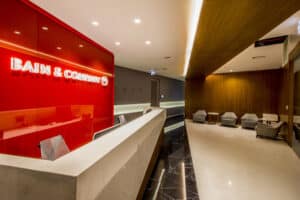Boston Consulting Group (BCG) is one of the world’s top-3 management consulting firms, together with McKinsey and Bain. It is also one of the most selective employers in the world.
Although BCG is smaller than McKinsey – which is considered to be the industry leader – it’s starting to catch up in terms of revenue, posting $12b for 2022, compared to McKinsey’s $15b. With 30,000 employees worldwide, BCG covers most industries and geographies, and has a presence in over 50 countries and 100 cities.
In this article we take an in-depth look at BCG, including its history, what it’s known for and what it’s like to work there. We also consider how to answer the question “why BCG?” in a fit interview.
A brief history of BCG
BCG was founded as part of The Boston Safe Deposit and Trust Company in 1963 by Bruce D. Henderson, one of the ‘Great American Business Leaders of the 20th Century’, according to Harvard Business Review.
The firm was officially named Boston Consulting Group in 1969 to reflect Henderson’s collegial approach to leadership. In 1975, BCG purchased the firm from The Boston Company through an employee stock ownership plan (ESOP) and became an independent entity.
By 1987, BCG had developed practice areas in four industry sectors: financial services, consumer products and retail, health care, and ‘high tech’. It had two functional areas: operational efficiency and mergers and acquisitions.
In 2000, the firm added IT architecture expertise to its capabilities, with the launch of BCG Platinion in Germany. Since then, BCG has continued to invest heavily in developing its digital and AI capabilities, launching BCG Digital Ventures in 2014, BCG GAMMA in 2015 and BCG X (which incorporates BCG Digital Ventures) in 2022.
More recently, BCG has focused on expanding its environmental expertise, launching a dedicated Climate Change and Sustainability practice in 2021. The firm served COP27 the following year as the climate change conference’s exclusive consulting partner.
Fueled by its growing technology capabilities – and likely benefiting from the misfortunes of McKinsey, which has been embroiled in a number of controversies – BCG has experienced significant growth in recent years.
What is BCG known for?
Like other top management consulting firms, BCG is known for working with the world’s largest organizations on some of their most important challenges and opportunities.
In 1970, it created and popularized the Growth Share Matrix, a framework that helps large corporations decide how to allocate cash among their business units. In 1988, BCG introduced the concept of time-based competition, which views time as the basis of strategy, rather than simply a resource.
Notable BCG alumni include former CEOs Indra Nooyi (PepsiCo), Susan Wojcicki (YouTube) and Ken Chennault (Amex), as well as Grammy award-winning musician John Legend. Bill Bain, the founder of top consulting firm Bain & Co, was a Partner at BCG.
What is the BCG culture?
When it comes to working at the firm, there are a number of factors that make life at BCG both unique and appealing:
Five ‘purpose pillars’ are fundamental to the firm’s culture
BCG places purpose at the heart of everything it does. Structured around the following five pillars, this emphasis on purpose has a strong bearing on the experience of being a consultant at BCG:
- Bring insight to light: “… by challenging traditional thinking and ways of operating, and bringing new perspectives to the toughest problems”.
- Drive inspired impact: “….by looking beyond the next deadline to the next decade and…collaborating closely with our clients to enable and energize their organizations”. A former BCG consultant on our coaching team tells us: “BCG strives for a very collaborative approach to working with clients, not only to get their buy in, but to develop the best solution together”.
- Conquer complexity: “…by discovering unique sources of competitive advantage and hidden truths in dynamic, complex systems”. Our coach adds: “BCG consultants are encouraged to think like entrepreneurs, take ownership of projects and seek innovative solutions. This entrepreneurial spirit is seen as essential for tackling complex business challenges”.
- Lead with integrity: “…by confronting the hard issues, staying true to our values and stating our views candidly and directly”.
- Grow by growing others: “…enabling our clients, colleagues, and the broader community to build success and achieve their full potential”. Our coach tells us: “At BCG, colleagues at every level are incredibly collaborative and helpful; even Senior Partners take the time to explain things clearly and comprehensively”.
Individuality is encouraged
BCG is a place where individuality is promoted and people are never pressured to conform with either colleagues or clients. Many former or current BCG consultants report that there is no single ‘BCG way of working’ or ‘BCG way of being’.
Another former BCG consultant on our coaching team tells us: “Because diverse perspectives are valued, every member of a BCG project team is encouraged and expected to have their own perspective on the problem, and to share it in case team meetings”.
Reflecting on her experience at BCG, our other coach recalls: “In my interviews everyone was so interested in me as a person: who I was and what was driving me, rather than simply what was written on my CV. Later on, as a BCG recruiter, many of my discussions about candidates revolved around their cultural fit with the firm and their ability to have an impact on BCG and help to make it a better company.”
This focus on individuality is underpinned by BCG’s global program ‘PTO’ (predictability, teaming and open communication), which is designed to help case teams both optimize for collaboration and set aside ‘protected time’ for individuals. The program is described by the firm as “a flagship example of BCG’s constant pursuit of better ways to work”.
Like other top consulting firms, BCG has a strong commitment to diversity, equity and inclusion, both through its hiring practices and its community affiliation initiatives.
Feedback is focused on strengths
Introduced in 2016, BCG’s strengths-based approach to feedback involves focusing on an individual’s strengths, rather than their weaknesses.
According to a 2017 Harvard Business Review article, this initiative resulted from research showing that 63% of BCG consultants felt that feedback focused too heavily on areas for development. To address this issue, training and tools were introduced to enable managers to ground personal development in an individual’s differentiating strengths by creating a strengths inventory and linking each strength to a specific area for development.
This shift has changed how professional development is talked about at BCG, fostering a supportive environment in which consultants are developed and stretched in a positive way. It has also contributed to an 18% reduction in the number of senior managers who think that feedback at BCG centers excessively on development areas.
Meanwhile, this approach has helped BCG consultants leverage their strengths in order to address their weaknesses and accelerate their development.
Collaboration and fun are valued
BCG aims to foster an open and collaborative environment, and to break down barriers between cohorts, levels of seniority, and consulting and non-consulting staff. To this end, it provides a vast range of opportunities for colleagues to get to know one another, from monthly drinks to a variety of other social events, including annual ski trips.
How to answer the “why BCG?” question in a fit interview
The question “why BCG?” – which interviewers use to understand a candidate’s motivation for applying to the firm – is a formal element of the firm’s fit interview. If you’re in the process of applying to join BCG, it’s vital to spend some time considering how you will answer this question as part of your interview preparation.
Aim to be as specific as possible in your answer and avoid making generic statements. Having an example of how your unique strengths, goals or values align with the firm can be especially effective. This might be in relation to the work that BCG does, the types of clients it supports or its culture.
It can also be helpful to highlight the research you have done into life at the firm, and to articulate why you have built such a positive impression.
If a career in management consulting sounds like it might be right for you, you can learn more in our complete guide to the management consulting industry. And if you’re preparing to apply to BCG, the resume and cover letter templates and specialized advice in our Free Resume Course will help you get your application in great shape.







